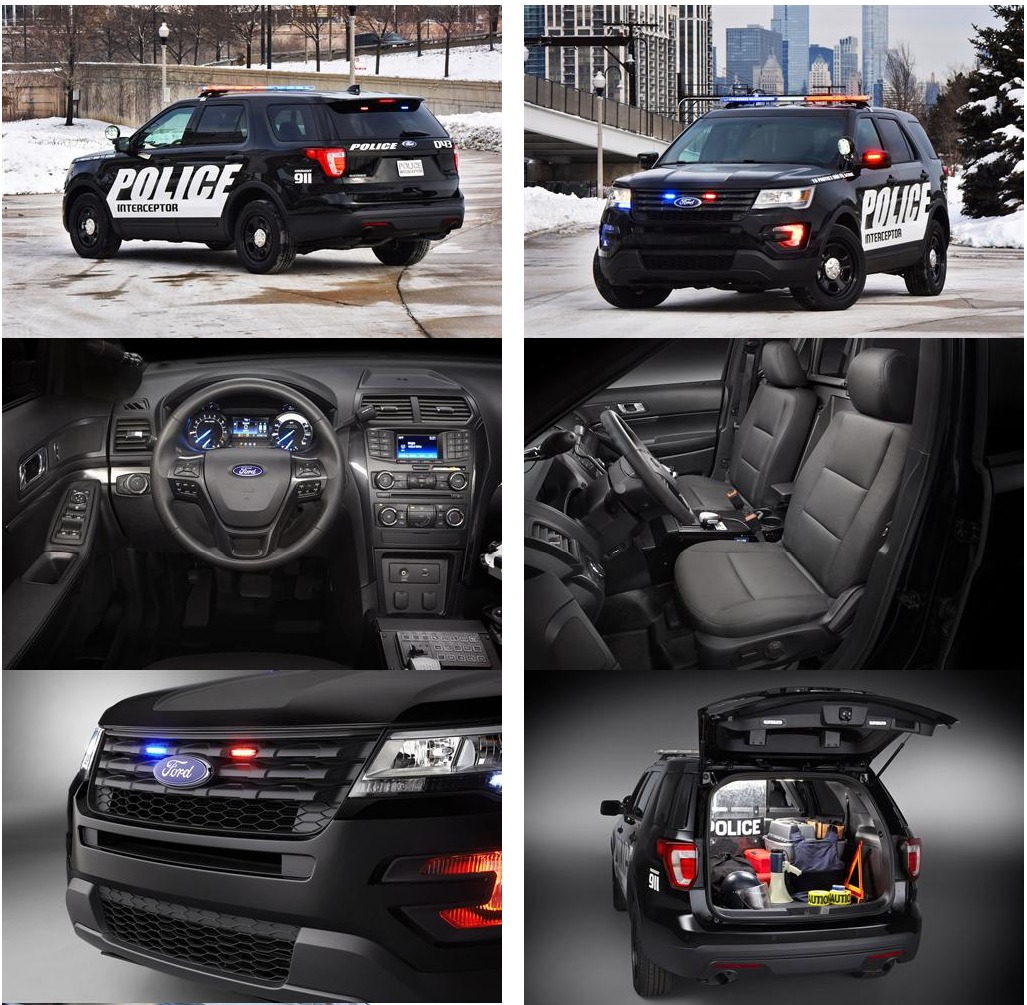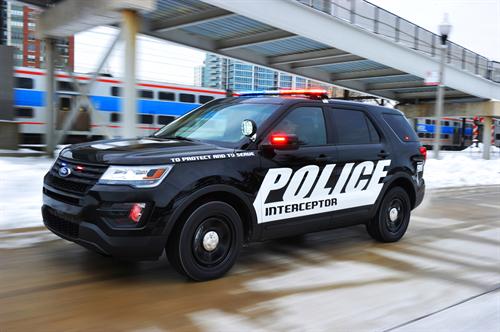DEBUTS AT CHICAGO AUTO SHOW, SETS ITS SIGHTS ON INNOVATION, CONTINUED SALES LEADERSHIP
- Ford Police Interceptor – the top-selling law enforcement vehicle in the United States – is ready to hit the streets with a fresh look and new features this summer
- 2016 Ford Police Interceptor Utility, created with hands-on input from Ford’s Police Advisory Board of law enforcement professionals, is the most customer-centric, purpose-built vehicle from Ford
- Ford Police Interceptor Utility and Police Interceptor Sedan are built at Ford’s Chicago Assembly Plant and shipped to markets across the world
CHICAGO, Feb. 11, 2015 – Ford will unveil the 2016 Ford Police Interceptor Utility vehicle at the Chicago Auto Show this Thursday, kicking off a new chapter for the utility that has changed the face of law enforcement.
Since its introduction in 2012, Police Interceptor Utility quickly became America’s best-selling police vehicle, helping Ford capture 55 percent of the U.S. law enforcement vehicle market.
The 2016 Ford Police Interceptor Utility was developed with input from the Ford Police Advisory Board to handle the extreme rigors of police duty. In the business of fighting crime, performance and durability are king. Ford Police Interceptor Utility is the only Pursuit Rated midsize utility vehicle; Ford’s utility and sedan versions are the only Pursuit Rated vehicles with standard all-wheel drive.
“Our Police Interceptor Utility is the best-selling police vehicle in America because we have a unique relationship with our customers,” said Jonathan Honeycutt, Ford North American marketing manager for Police Vehicles. “By listening to the Ford Police Advisory Board, we have engineered a vehicle that officers love.”

Customer-driven innovation
To create the most innovative law enforcement vehicles, Ford listened to the experts.
The Police Advisory Board was created by Ford to refine and develop future products that meet the needs of law enforcement agencies. The board, created in 2000, consists of a rotating panel of 25 experts from the law enforcement community. The group has supplied Ford with customer feedback and served as a pilot group for products, programs and services.
The 2016 Ford Police Interceptor Utility features a new front and rear design, new headlamps, a new instrument panel and an enhanced electrical system to distribute electrical loads more efficiently.
Available Surveillance Mode technology warns the driver when someone approaches the rear of the vehicle. Upon detection, the driver’s window automatically raises and all doors lock. Ford is the first manufacturer to bring this innovative feature to market.
As a direct response to customer feedback, Ford added a liftgate release switch, accessible to occupants in the front. It allows the rear liftgate mechanism to remain unlocked for 45 seconds before timing out, permitting officers to access the cargo area.
A rear camera with washer is standard for the 2016 model with a 4-inch screen in the center stack. As an option, the view from the camera can be seen in the rearview mirror.
Ford Police Interceptor Utility comes standard with a 3.7-liter V6 producing 304 horsepower and 279 lb.-ft. of torque, while an available 3.5-liter EcoBoost® V6 makes 365 horsepower and 350 lb.-ft. of torque, allowing agencies to select the engine that best meets their patrol requirements. Police Interceptor Utility’s standard all-wheel drive is designed to deliver low-speed traction and high-speed handling and stability.
“From the heavy-duty suspension and powertrain offerings, to the unique steering and transmission calibrations, Ford Police Interceptor Utility is built to provide any law enforcement agency a vehicle ready to meet extremely demanding needs,” said Arie Groeneveld, chief engineer for the new Police Interceptor Utility.
Both engines have been calibrated to meet extreme test requirements defined by the Michigan State Police and Los Angeles County Sheriff’s Department. Tests include aggressive driving on road courses and racetracks, braking and acceleration, top speed and city pursuit testing.
In both Police Interceptor models, the standard six-speed transmission features a unique Pursuit Mode specifically programmed for law enforcement use. The transmission automatically switches from normal, fuel-saving operation to Pursuit Mode when it detects aggressive driving situations, based on brake line pressure, deceleration and lateral acceleration rates.
Once in Pursuit Mode, the upshift and downshift performance of the transmission is optimized for aggressive driving, returning to fuel-save mode when it senses the aggressive driving is complete. The software is tuned to perform a reverse J-turn, which is when a reversing vehicle is spun 180 degrees and continues, face forward, without changing direction of travel.
In addition to unique cooling systems designed for extreme use, Police Interceptor also features custom-developed brakes designed to withstand excessive use. The 18-inch steel wheels have high venting characteristics to help cool the brakes.
The vehicle has been designed to stand up to the demands of police work, with heavy-duty powertrain mounts, reinforced subframe mounts and unique hubs and bearings. Larger-diameter springs are used in the suspension. The upgrades help ensure every Police Interceptor model can handle the extreme rigors of law enforcement work. Even the tires are specifically designed to meet durability and pursuit standards, with some departments logging as many as 50,000 miles per year.
The unibody structure of Police Interceptor Utility features boron steel in the A-pillar and a hydroformed, high-strength steel tube that runs the width of the vehicle to improve structural rigidity. Interior and exterior dimensions remain the same for the 2016 model.

Designed in Dearborn, built in Chicago
Police Interceptor Utility and Police Interceptor Sedan are sold in more than 80 markets around the world, but built in the heartland of America, at Ford’s Chicago Assembly Plant. Once initial work is completed at Chicago Assembly Plant, the vehicles are transported less than a mile away to Troy Design and Manufacturing to be upfitted with law enforcement equipment.
A wholly owned subsidiary of Ford, Troy Design and Manufacturing operates out of a 54,000-square-foot facility, where approximately 200 workers bring Police Interceptor vehicles to life. Law enforcement agencies can select from 125 packages, which include a variety of lighting options, wraps and styles. Last year, an estimated 269,000 police-duty accessories were installed on 36,000 vehicles before shipping to police departments across the globe.
One of the most important and recognizable features of Police Interceptor are the lights. The 2016 Police Interceptor Utility allows agencies to choose from up to 25 different patterns. The lights are now better integrated into the new front and rear fascia, allowing for a more seamless design and a stealthier look for patrol duty.
In a nod to police vehicle nostalgia, Ford added a blinking white function called “wig-wag” to the incandescent high-beam light bulbs.
Other key technologies available on Ford Police Interceptor Utility:
- Ballistic shields built to Level III specifications determined by the National Institute of Justice Standard, factory-installed in the driver and passenger doors for additional protection against gunfire
- SYNC®, a hands-free information technology so officers can operate various communication and audio equipment by voice control
- Available Blind Spot Information System (BLIS®), which uses two radar sensors located in the rear quarter panels to detect vehicles in the surrounding lanes. If a vehicle enters the driver’s blind spot zones, the system alerts the driver with a warning light in the sideview mirror
- Available cross-traffic alert, which uses existing BLIS radar modules to sense oncoming traffic when slowly backing out of a parking spot. The system functions only while the vehicle is in reverse and warns when cross traffic appears within three car-widths
- Available Reverse Sensing System, which emits an audible tone to alert the driver to certain objects up to 6 feet behind the vehicle
